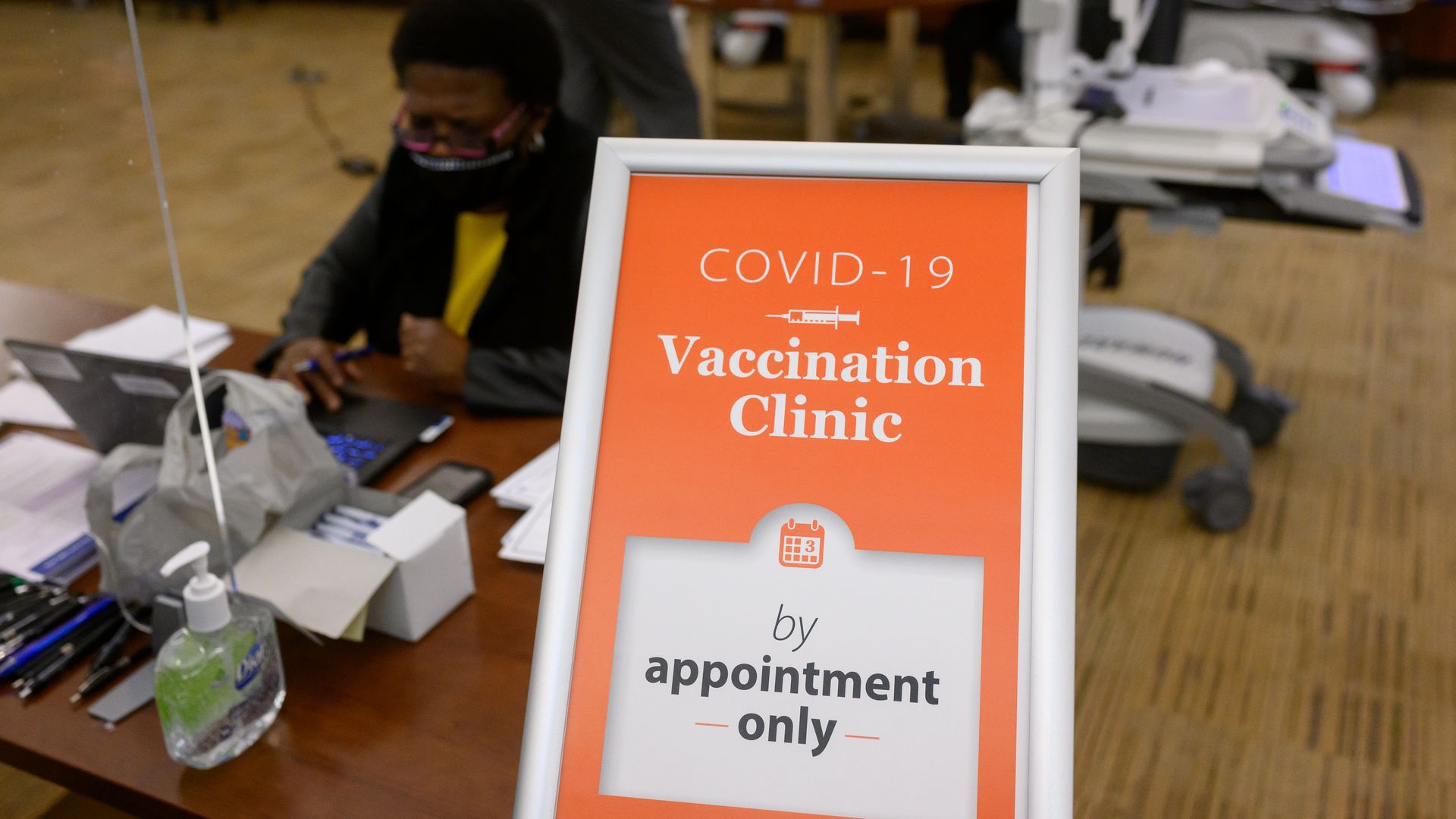States say federal government cutting COVID-19 vaccine allocations
Add Axios as your preferred source to
see more of our stories on Google.

A sign announcing the beginning of immunizations against COVID-19 at the Pittsburgh VA Medical Center on in Pittsburgh, Pennsylvania. Photo: Jeff Swensen/Getty Images
Officials in several states have said the federal government told them to expect fewer doses of Pfizer's COVID-19 vaccine next week than originally anticipated.
The big picture: Some 2.9 million doses of the Pfizer-BioNTech vaccine were shipped this week as the U.S. started it's largest vaccination campaign in the nation's history. Health and Human Services Secretary Alex Azar said Wednesday that 2 million more doses of the Pfizer vaccine and 5.9 million doses of the Moderna vaccine could be allocated next week, per CNBC.
- A Food and Drug Administration advisory panel on Thursday recommended the approval of Moderna's coronavirus vaccine for emergency use. The vaccine could get emergency authorization as soon as Friday, per the New York Times.
What they're saying:
- Washington Gov. Jay Inslee (D) tweeted Thursday that the Centers for Disease Control and Prevention "has informed us that WA’s vaccine allocation will be cut by 40 percent next week — and that all states are seeing similar cuts."
- "This is disruptive and frustrating. We need accurate, predictable numbers to plan and ensure on-the-ground success. No explanation was given," Inslee added.
- Illinois Gov. J.B. Pritzker (D) said Wednesday that per "the direction of Operation Warp Speed’s General Perna, that estimate was tightened significantly down to 4.3 million doses shipped nationally next week. The following week, originally projected for another 8.8 million, is also now also scheduled to be 4.3 million," NBC 5Chicago reported.
- “I now no longer believe projections that are put in front of us by the federal government,” Pritzker added. “Having said that, we’re hopeful that they’re accurate."
- A spokesperson for Michigan's Department of Health and Human Services told Axios that the state is expected to received fewer doses next week than it originally anticipated. "We were not provided an explanation," Lynn Sutfin said in an emailed statement.
- A spokesperson for Iowa's Department of Public Health said in a statement on Wednesday that the federal government told state officials that Iowa "as well as all other states, will not receive the volume of vaccine initially anticipated."
- "It appears our allocation may be reduced by as much as 30%, however we are working to gain confirmation and additional details from our federal partners. It will take us some time to work through next steps and adjust our planning," Sarah Ekstrand added.
- Officials in Maryland also said they were expecting a reduction in the number of doses they were projected to receive, per the Baltimore Sun.
- Maryland Gov. Larry Hogan (R) said in a news conference Thursday that his team was still trying to figure out the details of what would be allocated to the state. The federal government "did tell us that while these were projections, every Friday they would give us a confirmation" on what would be shipped the following week.
- Hogan added that the reductions were not "apparently going to impact our first batches for a week or two."
An HHS spokesperson said in an emailed statement that "reports that jurisdictions’ allocations are being reduced are incorrect. As was done with the initial shipments of Pfizer vaccine, jurisdictions will receive vaccine at different sites over several days."
- "Operation Warp Speed allocation numbers locked in with states have not been changed or adjusted. Only three official allocations have been provided to states: Week 1 Pfizer allocations were provided Friday, Nov. 20; week 1 Moderna allocations were provided Friday, Nov. 27; and week 2 Pfizer allocations were provided Tuesday, Dec. 15. Those are the only official allocation numbers that have been provided," the spokesperson added.
- "Operation Warp Speed remains on track to allocate enough vaccine for about 20 million Americans to receive their first doses before the end of the month, pending Moderna receiving an EUA.”
- McClatchy reported later on Thursday that Tiberius, a Pentagon system used by states to keep track of the vaccines, "had outdated, inaccurate projections for deliveries."
- “Tiberius has been online for a couple of months, and it’s where a lot of the exercise and planning modules were where they could see potential allocations,” a federal official told McClatchy. “The problem is that they kept those exercising and planning modules in there, and that’s what people were looking at as late as last week.”
- The Pentagon referred Axios to HHS for comment.
Pfizer said in a statement Wednesday that it has millions of doses "sitting in our warehouse but, as of now, we have not received any shipment instructions for additional doses."
- "We have continuously shared with Operation Warp Speed (OWS) and the U.S. Department of Health and Human Services through weekly meetings every aspect of our production and distribution capabilities. They have visited our facilities, walked the production lines and been updated on our production planning as information has become available," Pfizer added.
- Pfizer's statement came after Azar told CNBC on Wednesday that the company has to keep the Trump administration at "arms length" on the manufacturing of its vaccine.
Go deeper: Extra doses of Pfizer vaccine could expand U.S. supply
Editor's note: This story has been updated with the statement from HHS and McClatchy's reporting on Tiberius.
